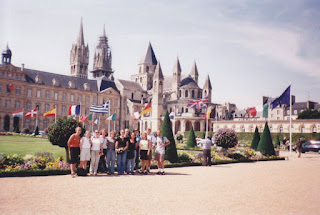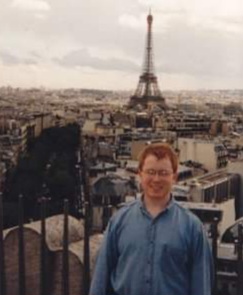Growing up in the Philippines has given me a perspective of living in a culture different from my parents'. Joseph was a
(TCK) like me, though our experience was obviously different. In some ways I can identify with the adjustments in being a part and product of the culture where I live and also that of where I'm from. Where even is "home"? One thing that gets me is a detail that I think is often overlooked... When Joseph was confronting his brothers as governor, he was speaking Egyptian, working through a translator. They had no idea he could understand them. He didn't speak to them in Hebrew until he revealed himself to them. The story evokes strong emotions for me, and I wasn't even there. I think one of the saddest parts of the story is that even though Joseph forgave his brothers, they never forgave themselves.
I wrote this poem October 10, 2010. In researching, I learned a few things:
- Zaphenath-Paneah is the anglicized spelling of the Hebrew approximation of his Egyptian name. Thus, scholars disagree on the exact meaning of his name. Here I used three possibilities from different scholars, in italics.
- It is likely that the -ath in his new name was the hieroglyph ankh (ቶ), the Egyptian concept of life, immortality and more.
- I knew the meanings of some of the names, but I learned more when researching. In the poem, most of the italicized bits are the meanings of people's names. Joseph = "may he add"; Jacob = "he grasps the heel"; Potiphar = "one belonging to Ra"; Benjamin = "son of my right hand"; Moses = "drawn from the water"
 |
I searched for more information on this painting,
but couldn't find any information on who painted it.
If anyone knows, I would love to credit the artist. |
A dreamer of dreams
A boy with a promise of a bright future
Brothers bowing before him
Father and mother paying homage to their son
Joseph bar-Jacob.
May he add to the son of he who grasps the heel.A young man hurled in a pit
Ripped from his parents
Sold and taken to a foreign land
A slave in the captain’s court.
Joseph, slave of Potiphar.
May he add to the one belonging to Ra.Framed for a horrible crime
Thrown, innocent, into prison
Interpreting dreams for his fellows
Forgotten by the one released.
So much promise, dreaming, love
Such pain, betrayal, anguish
Forgotten for years
Wallowing in prison
Ankh slowed to a boring and endless crawl
God seemed silent and distant
Where was the hope of release?
Why such betrayal and slander?
Brought before the Pharaoh himself
New dreams to interpret
Seven years of plenty
And seven years of famine
And so Joseph, son of Jacob
Slave of Potiphar
Prisoner of Egypt
Received a new name.
Zaphenath-Paneah.
“The god sees, and he lives.”Through all of it, God watched
God trained His child through love,
Through pain, through trials.
God saw Joseph, and Joseph lived.
“A revealer of hidden things and an opener of things to come.”A man who, with the help of God, could reveal the meanings of dreams
Who foresaw his ascent, an execution, a restoration to service,
Seven years of plenty and seven years of famine.
“One who furnishes the nourishment of life.”Suddenly pardoned and made governor
Stored wheat to preserve Egypt through the famine
Nourished and saved millions of lives.
One who so recently yearned for greater
ankhSuddenly named as one who provided
ankh****
Brothers who lived with the guilt of selling their brother
For all they knew, he could be dead
But just to be sure, they had killed a goat
And smeared the blood on their brother’s coat
Bringing a fictional tale of woe to their heartbroken father
Famine in Canaan
Few crops and dwindling herds
News of a surplus of grain saved up in Egypt
And so ten brothers left their father’s house
Leaving the youngest behind
And traveled to buy grain
From the exalted Governor of Egypt:
Zaphenath-Paneah.
Framed for spying on Egypt
Cringing in fear before the wrathful governor
Thinking the Egyptian governor could not understand,
They cried out in Hebrew
Regretting their treatment of their brother and father
And they wondered why the exalted Egyptian Zaphenath-Paneah ran out of the room in tears.
One thrown in prison while the rest were sent home
To bring their youngest brother
And prove their honesty
And so came Benjamin to Egypt
The imprisoned brother freed
And the
son of Jacob’s right hand framed
For stealing a priceless golden cup.
Terrified brothers fell at the feet of Zaphenath-Paneah
In fulfillment of a dream, bowing at his feet
Begging to spare the life of their brother
And keep their father from dying of grief
And so the great Zaphenath-Paneah told all his servants to leave
The brothers wondered what was about to happen
When the interpreter, their only means of communication,
Walked out of the room.
And so for the first time, the great Zaphenath-Paneah spoke to them in Hebrew
And gave them news that filled them with wonder and fear
God heard, and Joseph was still alive.
God sent His child to reveal what was to come,
To preserve the lives of Egypt
And of his own family.
And so the children of Israel flourished and became a great nation
They lived in Egypt for 400 years
God saw them, and they lived
And God sent a new child,
drawn from the waterTo bring His children back to Canaan
And with them came the sarcophagus
Of Zaphenath-Paneah.
.jpg) |
Photo taken at the
African Burial Ground National Monument,
New York, by Sean Ghazala
Public Domain |












.jpg)






